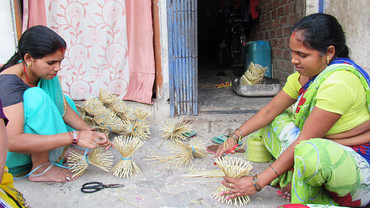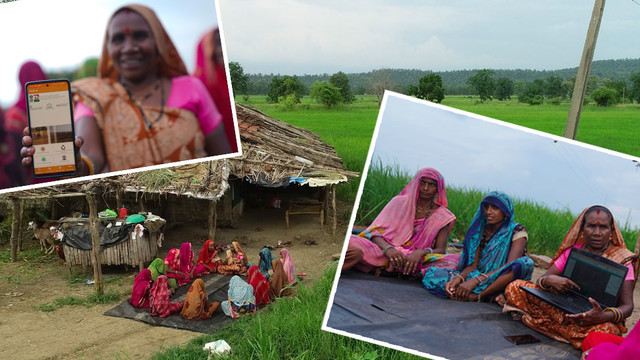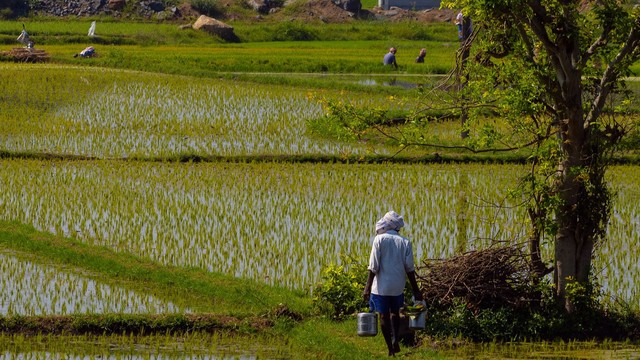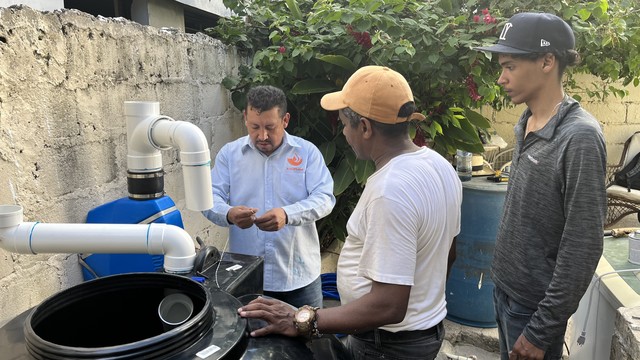Climate, health and urban informal economies – stories of need and change
‘Informal’ workers’ precarious and risky labour underpins many urban economies. Overlooked by policymakers, their health suffers with climate change. Lived experience from Indore, India and Harare and Masvingo in Zimbabwe illuminates three areas where urgent action is needed.
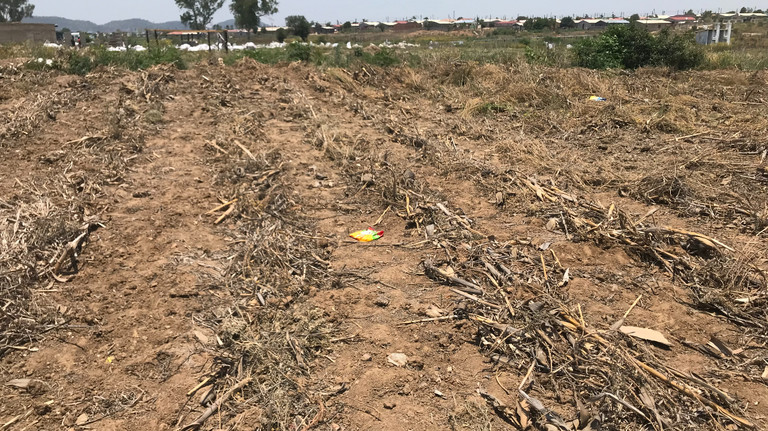
Rainfed urban agriculture responding to water stress in Masvingo, Zimbabwe. Old maize stalks have been retained and will be used as water conservation material protecting the crops from the increasing and unpredictable dry spells during the rainy season (Photo: Training & Research Support Centre (TARSC))
In 2019, over 88% of India’s employment was informal. Similarly, 79.8% of Zimbabwe’s employment was informal (according to 2019 Labour Force Surveys). The workers in India, mostly urban, contribute over 50% of GDP. In Zimbabwe, informal work contributes about 60% of GDP (PDF).
These workers are already marginalised, often living in unplanned neighbourhoods lacking basic services.
Increasingly, climate change damages their health and earning power. Women have extra burdens, children miss education and poverty gets locked in. It’s time policy responded to their needs.
Worsening problems
Heat stress

For urban agriculture workers who sell fresh produce, extremes of heat are likely to affect perishable products such as leaf vegetables and tomatoes. However, this presents opportunities for sun-drying these products. (Photo: Training & Research Support Centre (TARSC))
Climate change is heating life up, especially for informal workers. Whether travelling far to collect and clean plastic for recycling, or farming at the city edge, they get little respite.
Corrugated metal, often used for roofs, transmits heat into living spaces, and biomass stoves add to the problem. It’s hard to keep food fresh – so food poisoning can go up, and nutrition down.
Factory work is hot too. Hansi, a 36-year-old woman from Indore, said: “I work in the chips factory from 9am-6pm, close to a boiler… After returning from work, it is me who has to cook for the family… in my single room house. I feel drained out.”
Downpours and floods
Downpours often wash sewage into homes in informal settlements. Rain frequently damages documents needed to claim benefits, and spoils stored food.
Neerja, an Indore street vendor, said: “Water drips from the crevices of my house. I have no choice but to keep vessels to collect rainwater… We do not have enough savings to repair the roof.” And rain keeps Neerja’s customers away too.
Garbage
Climate change makes rubbish a bigger health problem. Refuse collections get missed in informal settlements – residents in Mabvuku-Tafara, Harare reported a three-month gap.
Pests and diseases thrive in hotter or wetter conditions, and backyard incinerators pollute the air.
Water scarcity and quality

A handwashing tap at a market in Masvingo, Zimbabwe. (Photo: Training & Research Support Centre (TARSC))
Clean water – a right for many – brings costs for informal workers.
Personal and food hygiene is harder when water is scarce. Water piped from boreholes may be contaminated by pit latrines or industrial pollutants, or may run dry.
Women bear the main burden – literally. Carrying heavy loads causes injuries, and the work is unsafe.
In Mabvuku-Tafara, a woman said: “Drivers and volunteers of water bowsers are openly asking for sex in order to supply us with water. We refused and [they] are no longer supplying our section.”
Energy
Energy supply, climate and health problems intertwine, sometimes directly. Droughts can lower hydropower reservoirs, or storms may damage infrastructure.
Sometimes, power cuts cause indirect harm. “We wake up when it is dark to go and look for water and have no public streetlights,” said a woman from Masvingo. “We have had three cases of women who were sexually abused.”
Without clean power, people use more candles and polluting stoves.
In Zimbabwe, some households reported avoiding nutritious but slow-cooking foods like beans. Some used old shoes, bottles, clothes and tyres as fuels.
And when climate risks depress earnings, energy problems get reinforced. People choose cheaper polluting fuels. Fire risks go up. People can lose their houses, but also their work-from-home livelihoods (especially women).
Three areas for action
Institutional change
Reform bureaucracy: it’s often difficult for informal workers to access benefits. Aradhana makes necklaces at home in Indore. Her family was entitled to subsidised food, but lacked the paperwork. After applying many times, she lodged a complaint.
Six months later, she received her paperwork – but without all the family names. It took another two months to update it. She said: “I knew that these officers remain lazy to do their work, but they require constant pressure from the public.”
Meanwhile, in Zimbabwe there are no such social protection schemes, despite organisations such as the Zimbabwe Chamber of Informal Economy Associations (ZCIEA) advocating for them.
Yet there is other progress. In Masvingo, an agreement between ZCIEA and the local authority has generated a ‘champions team’. One joint priority is better waste management.
Plastics are already sold for recycling. Now a project plans to separate more waste, especially compostable material. This community-based pilot could remove ‘middle-men’, who pay too little, and generate a better community waste culture.

Waste dumping near a market in Masvingo. A champions team is engaging the local authority on the possibility of using biodegradable waste from the market to produce biogas or organic manure to sell (Photo: Training & Research Support Centre (TARSC))
Support collective action that taps local wisdom: the Urban Health Resource Centre (UHRC) has helped residents’ groups in Indore share draft letters requesting water from the Narmada Pipeline.
In September 2021, residents of Kavi Nagar wrote to their Zonal Office, and in October submitted a reminder via official public hearings where government officers must give receipts. In November, 400 households received connections.
UHRC has also progressed other community requests: for paving, sewerage and boreholes.
Make long-term institutional plans to strengthen economies and depoliticise service provision: one urban farmer in Mabvuku Tafara said: “Water is life. The government should come in and help the councils so that they are able to provide water to everyone in the city.
“We have spent almost 20 years here without a reliable source of water.”
Tackling marginalisation
Support women in their triple roles of domestic work, caregiving and wage earning: when Sarla’s husband died, she took responsibility for her home and son, and also her husband’s Indore broom-making business. Sarla operates the dangerous binding machine, while her mother-in-law sells brooms street to street.
Women’s lower education, traditional gender roles and discrimination all curtail opportunities: construction worker Shipra said: “I sieve sand. I carry bricks over my head. This work entails more effort while men are simply here to plaster the mixture of cement and sand. Yet I am paid less. I also have not had the opportunity to upgrade my skills.”
Foster urban agriculture and secure tenure: Indore has many large peri-urban farms. When there’s no agricultural work, farms give Kashi Damke produce. She explained: “The farmer knows me for 15 years. He is aware that I need to sell vegetables when farm work is not available.”
Around Masvingo, Zimbabwe, people are farming, but often on temporary plots. Only 2% own their farm land. Giving them more secure tenure would encourage sustainability. Conversely, unregulated urban agriculture, especially in wetlands, can damage water supplies and worsen climate risks.
Recognising opportunities
Support incremental self-building: people build their resilience over time. Farmworker Kashi’s family have gradually upgraded their house to include an elevated floor, two storeys, a better roof, toilet and kitchen.
Capitalise on young people’s drive to succeed: Laxman, now 22, took on informal jobs alongside work in an Indore shoe company. When his house was destroyed, he rebuilt a simple home, sold eggs, tobacco and snacks from a stall, and bred and sold pets.
Despite accumulating medical debts and losing his father to COVID-19, Laxman has coped. He says “It will take some time for things to get stabilised. I stay hopeful and work.”
Diversify, upskill and regularise livelihoods: in Zimbabwe, plastic pickers wanted to move beyond ‘survival mode’ but often lacked business skills. Training to avoid contaminated plastics, certification for buyers, regularised washing spaces (which would reduce water pollution) and collection points could help.
Invest long-term in renewable energy: this is key to bettering informal workers’ health.
Most importantly, seize opportunities for multiple benefits: for example, biogas from solid waste offers energy, but also cleaner, more healthy settlements. Multiple benefits offer the best redress to climate change’s health and livelihood risks.
This case study draws on research by IIED’s partners Urban Health Resource Centre (UHRC) in India and in Zimbabwe, the Training And Research Support Centre, the Zimbabwe Congress of Trade Unions, and the Zimbabwe Chamber of Informal Economy Associations (ZCIEA).
This research was commissioned by the National Institute for Health Research (NIHR), Global Health Research Group using UK aid from the UK government. The views expressed are those of the author(s) and not necessarily those of the NIHR or the Department of Health and Social Care.

